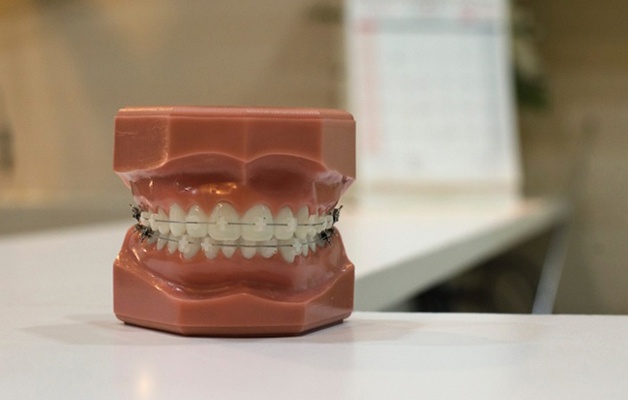
More often than not, when we think about someone wearing braces, the first image to pop up in our mind is an adolescent in their early-to-mid teens. And it’s true: the overwhelming majority of orthodontic installations occur between ages 12-15, according to the American Dental Association.
Still, you may be surprised to learn that over a quarter of all patients who get braces each year are adults. In most cases, getting adult braces is an aesthetic choice where someone decides to invest in their smile to look better. In other cases, adult braces are recommended to treat very crooked teeth, misaligned bite, and other oral issues.
Regardless of the reason behind your decision, the experience of having braces as an adult differs from that of adolescence. If you’re considering getting braces as an adult, there are important steps you should take to prepare yourself, both physically and financially, to get the most out of this valuable procedure.
Preparing physically for braces
If you’ve never had them before — or even if you had braces when you were younger — you’ve probably wondered how to prepare for braces as an adult. In reality, this new experience may take some time to fully adjust to. If possible, connect with peers who have recently started wearing braces and those who’ve had them in for at least a few months. Hearing adult braces stories from others can help you prepare for your own.
Between these individuals and the guidance of your dentist and orthodontist, you should be comfortable when it comes to preparing for braces and better understand what you can expect as you start wearing braces yourself.
What does it feel like?
Many people are overly concerned about the possibility of pain or discomfort when it comes to wearing braces. The first day or two after they’re installed and the first day or two after each adjustment can include some mild discomfort because of the tension placed on your teeth and gums. However, it’s generally easily tolerable and when necessary, over-the-counter pain relievers should be all you need to alleviate any pain or tenderness you may experience.
It will also take some time to get used to the feeling of having a new object in your mouth. You’ll notice the braces rubbing on the inside of your mouth, against the inside of your lips and cheeks. Because of this, you may be more prone than usual to biting your tongue or cheeks. Try to chew slowly and move your mouth deliberately until you get used to the sensations and learn how to accommodate for having braces.
How do I take care of my teeth now?
Daily oral health habits are one of the key issues you’ll need to address when physically preparing for braces. Although having the necessary supplies to properly brush, floss, and otherwise caring for your teeth and gums is always important, having an appliance in your mouth makes the job more important — and more challenging. Taking steps before getting braces to develop more diligent oral hygiene habits will go a long way toward long-term success.
If your teeth aren’t carefully cared for with braces, issues like cavities, discoloration of the tooth surface, and infections can all be exacerbated. In some cases, once braces are removed, the areas covered by the brackets can retain their old color and condition, creating an obvious contrast.
How will braces affect your diet?
While the list of foods you absolutely should not eat with braces is relatively small, there are a number of foods that you should consider preparing differently if you’re going to continue to enjoy them with braces.
Your dentist or orthodontist will likely provide you with plenty of information to aid with this transition and share helpful ideas for how to enjoy certain foods.
Preparing financially for braces

"You may be surprised to learn that over a quarter of all patients who get braces each year are adults. In most cases, this is an aesthetic choice where someone decides to invest in their smile to look better."
Aside from concerns about pain or discomfort, the cost of orthodontics tops the list of reasons why patients hesitate to take the plunge when contemplating getting adult braces. This makes a lot of sense because not only are braces very expensive (averaging $3,000 to $10,000, depending on the style and individual needs), but many dental insurance plans offer no coverage toward orthodontics for patients older than 18.
So, preparing for braces financially is an important consideration. Because it could require a significant investment, it’s wise to save money if and when you can.
Do your due diligence
Since many adult patients will need to pay out of pocket for services, orthodontists may offer financing options and payment plans to keep their services competitive and attainable. When the cost of adult braces is still prohibitive, there are discount options available to help you save.
A discount dental card provides access to savings on orthodontic services through a nationwide network of dentists. This can help you save significantly on the full cost of braces for a small monthly fee of less than $10.
Beyond price, it’s also important to compare different orthodontists, their schedules and availability, and to review patient feedback to determine if they’re a good fit for you. After all, you’re going to be seeing a lot of them over the next few years for examinations and adjustments.
Make it a savings goal
Once you’ve secured the best combination of price, payment options, and provider selection, you may find that your cost is lowest if you can provide a down payment at the time you get your braces. If possible, set money aside ahead of the first date of service to use for this purpose. Of course, this isn’t always possible or required, so it’s up to you to make the best judgement call for when to move forward with getting your braces.
Having braces as an adult is just as much of a commitment as getting them for your own child. By following the tips outlined above, you should be well prepared both physically and financially to get the most out of your new braces. Then, you’ll be able to share your positive experience and braces stories with others who are considering doing the same thing.
Interested in learning more about how a dental discount card can help you save on specialty services like braces? Click the button below to see how it works:

